- Home
- Emile Gaboriau
Within an Inch of His Life Page 8
Within an Inch of His Life Read online
Page 8
VIII.
In spite of its grand feudal air, the chateau at Boiscoran was, afterall, little more than a bachelor's modest home, and in a very bad stateof preservation. Of the eighty or a hundred rooms which it contained,hardly more than eight or ten were furnished, and this only in thesimplest possible manner,--a sitting-room, a dining-room, a fewguest-chambers: this was all M. de Boiscoran required during his rarevisits to the place. He himself used in the second story a small room,the door of which opened upon the great staircase.
When they reached this door, guided by old Anthony, the magistrate saidto the servant,--
"Knock!"
The man obeyed: and immediately a youthful, hearty voice replied fromwithin,--
"Who is there?"
"It is I," said the faithful servant. "I should like"--
"Go to the devil!" broke in the voice.
"But, sir"--
"Let me sleep, rascal. I have not been able to close an eye till now."The magistrate, becoming impatient, pushed the servant aside, and,seizing the door-knob tried to open it; it was locked inside. But helost no time in saying,--
"It is I, M. de Boiscoran: open, if you please!"
"Ah, dear M. Galpin!" replied the voice cheerfully.
"I must speak to you."
"And I am at your service, illustrious jurist. Just give me time to veilmy Apollonian form in a pair of trousers, and I appear."
Almost immediately, the door opened; and M. de Boiscoran presentedhimself, his hair dishevelled, his eyes heavy with sleep, but lookingbright in his youth and full health, with smiling lips and open hands.
"Upon my word!" he said. "That was a happy inspiration you had, my dearGalpin. You come to join me at breakfast?"
And, bowing to M. Daubigeon, he added,--
"Not to say how much I thank you for bringing our excellent commonwealthattorney with you. This is a veritable judicial visit"--
But he paused, chilled as he was by M. Daubigeon's icy face, and amazedat M. Galpin's refusal to take his proffered hand.
"Why," he said, "what is the matter, my dear friend?"
The magistrate had never been stiffer in his life, when he replied,--
"We shall have to forget our relations, sir. It is not as a friend Icome to-day, but as a magistrate."
M. de Boiscoran looked confounded; but not a shadow of trouble appearedon his frank and open face.
"I'll be hanged," he said, "if I understand"--
"Let us go in," said M. Galpin.
They went in; and, as they passed the door, Mechinet whispered into theattorney's ear,--
"Sir, that man is certainly innocent. A guilty man would never havereceived us thus."
"Silence, sir!" said the commonwealth attorney, however much he wasprobably of his clerk's opinion. "Silence!"
And grave and sad he went and stood in one of the window embrasures. M.Galpin remained standing in the centre of the room, trying to see everything in it, and to fix it in his memory, down to the smallest details.The prevailing disorder showed clearly how hastily M. de Boiscoran hadgone to bed the night before. His clothes, his boots, his shirt, hiswaistcoat, and his straw hat lay scattered about on the chairs andon the floor. He wore those light gray trousers, which had beensucccessively seen and recognized by Cocoleu, by Ribot, by Gaudry, andby Mrs. Courtois.
"Now, sir," began M. de Boiscoran, with that slight angry tone of voicewhich shows that a man thinks a joke has been carried far enough, "willyou please tell me what procures for me the honor of this early visit?"
Not a muscle in M. Galpin's face was moving. As if the question had beenaddressed to some one else, he said coldly,--
"Will you please show us your hands, sir?"
M. de Boiscoran's cheeks turned crimson; and his eyes assumed anexpression of strange perplexity.
"If this is a joke," he said, "it has perhaps lasted long enough."
He was evidently getting angry. M. Daubigeon thought it better tointerfere, and thus he said,--
"Unfortunately, sir, the question is a most serious one. Do what themagistrate desires."
More and more amazed, M. de Boiscoran looked rapidly around him. In thedoor stood Anthony, his faithful old servant, with anguish on his face.Near the fireplace, the clerk had improvised a table, and put his paper,his pens, and his horn inkstand in readiness. Then with a shrug of hisshoulders, which showed that he failed to understand, M. de Boiscoranshowed his hands.
They were perfectly clean and white: the long nails were carefullycleaned also.
"When did you last wash your hands?" asked M. Galpin, after havingexamined them minutely.
At this question, M. de Boiscoran's face brightened up; and, breakingout into a hearty laugh, he said,--
"Upon my word! I confess you nearly caught me. I was on the point ofgetting angry. I almost feared"--
"And there was good reason for fear," said M. Galpin; "for a terriblecharge has been brought against you. And it may be, that on your answerto my question, ridiculous as it seems to you, your honor may depend,and perhaps your liberty."
This time there was no mistake possible. M. de Boiscoran felt that kindof terror which the law inspires even in the best of men, when they findthemselves suddenly accused of a crime. He turned pale, and then he saidin a troubled voice,--
"What! A charge has been brought against me, and you, M. Galpin, come tomy house to examine me?"
"I am a magistrate, sir."
"But you were also my friend. If anyone should have dared in my presenceto accuse you of a crime, of a mean act, of something infamous, I shouldhave defended you, sir, with all my energy, without hesitation, andwithout a doubt. I should have defended you till absolute, undeniableevidence should have been brought forward of your culpability; and eventhen I should have pitied you, remembering that I had esteemed you sohighly as to favor your alliance with my family. But you--I am accused,I do not know of what, falsely, wrongly; and at once you hasten hither,you believe the charge, and consent to become my judge. Well, let it beso! I washed my hands last night after coming home."
M. Galpin had not boasted too much in praising his self-possession andhis perfect control over himself. He did not move when the terriblewords fell upon his ear; and he asked again in the same calm tone,--
"What has become of the water you used for that purpose?"
"It is probably still there, in my dressing-room."
The magistrate at once went in. On the marble table stood a basin fullof water. That water was black and dirty. At the bottom lay particlesof charcoal. On the top, mixed with the soapsuds, were swimming someextremely slight but unmistakable fragments of charred paper. Withinfinite care the magistrate carried the basin to the table atwhich Mechinet had taken a sea; and, pointing at it, he asked M. deBoiscoran,--
"Is that the water in which you washed your hands last night aftercoming home?"
"Yes," replied the other with an air of careless indifference.
"You had been handling charcoal, or some inflammable material."
"Don't you see?"
Standing face to face, the commonwealth attorney and clerk exchangedrapid glances. They had had the same feeling at that moment. If M.de Boiscoran was innocent, he was certainly a marvellously cool andenergetic man, or he was carrying out a long-premeditated plan ofaction; for every one of his answers seemed to tighten the net in whichhe was taken. The magistrate himself seemed to be struck by this; but itwas only for a moment, and then, turning to the clerk, he said,--
"Write that down!"
He dictated to him the whole evidence, most minutely and accurately,correcting himself every now and then to substitute a better word, or toimprove his style. When he had read it over he said,--
"Let us go on, sir. You were out last night?"
"Yes, sir."
"Having left the house at eight, you returned only around midnight."
"After midnight."
"You took your gun?"
"Yes, sir."
"Where is it?"
With an air of indifference, M. de Boiscoran pointed at it in the cornerof the fireplace, and said,--
"There it is!"
M. Galpin took it up quickly. It was a superb weapon, double-barrelled,of unusually fine make, and very elegant. On the beautifully carvedwoodwork the manufacturer's name, Clebb, was engraven.
"When did you last fire this gun?" asked the magistrate.
"Some four or five days ago."
"What for?"
"To shoot some rabbits who infested my woods."
M. Galpin raised and lowered the cock with all possible care: he noticedthat it was the Remington patent. Then he opened the chamber, and foundthat the gun was loaded. Each barrel had a cartridge in it. Then heput the gun back in its place, and, pulling from his pocket the leadencartridge-case which Pitard had found, he showed it to M. de Boiscoran,and asked him,--
"Do you recognize this?"
"Perfectly!" replied the other. "It is a case of one of the cartridgeswhich I have probably thrown away as useless."
"Do you think you are the only one in this country who has a gun by thismaker?"
"I do not think it: I am quite sure of it."
"So that you must, as a matter of course, have been at a spot where sucha cartridge-case as this has been found?"
"Not necessarily. I have often seen children pick up these things, andplay with them."
The clerk, while he made his pen fly across his paper, could not resistthe temptation of making all kinds of faces. He was too well acquaintedwith lawyers' tactics not to understand M. Galpin's policy perfectlywell, and to see how cunningly it was devised to make every factstrengthen the suspicion against M. de Boiscoran.
"It is a close game," he said to himself.
The magistrate had taken a seat.
"If that is so," he began again, "I beg you will give me an account ofhow you spent the evening after eight o'clock: do not hurry, consider,take your time; for your answers are of the utmost importance."
M. de Boiscoran had so far remained quite cool; but his calmnessbetrayed one of those terrible storms within, which may break forth, noone knows when. This warning, and, even more so, the tone in which itwas given, revolted him as a most hideous hypocrisy. And, breaking outall of a sudden, he cried,--
"After all, sir, what do you want of me? What am I accused of?"
M. Galpin did not stir. He replied,--
"You will hear it at the proper time. First answer my question, andbelieve me in your own interest. Answer frankly. What did you do lastnight?"
"How do I know? I walked about."
"That is no answer."
"Still it is so. I went out with no specific purpose: I walked athaphazard."
"Your gun on your shoulder?"
"I always take my gun: my servant can tell you so."
"Did you cross the Seille marshes?"
"No."
The magistrate shook his head gravely. He said,--
"You are not telling the truth."
"Sir!"
"Your boots there at the foot of the bed speak against you. Where doesthe mud come from with which they are covered?"
"The meadows around Boiscoran are very wet."
"Do not attempt to deny it. You have been seen there."
"But"--
"Young Ribot met you at the moment when you were crossing the canal."
M. de Boiscoran made no reply.
"Where were you going?" asked the magistrate.
For the first time a real embarrassment appeared in the features of theaccused,--the embarrassment of a man who suddenly sees an abyss openingbefore him. He hesitated; and, seeing that it was useless to deny, hesaid,--
"I was going to Brechy."
"To whom?"
"To my wood-merchant, who has bought all this year's wood. I did notfind him at home, and came back on the high road."
M. Galpin stopped him by a gesture.
"That is not so," he said severely.
"Oh!"
"You never went to Brechy."
"I beg your pardon."
"And the proof is, that, about eleven o'clock, you were hurriedlycrossing the forest of Rochepommier."
"I?"
"Yes, you! And do not say No; for there are your trousers torn to piecesby the thorns and briers through which you must have made your way."
"There are briers elsewhere as well as in the forest."
"To be sure; but you were seen there."
"By whom?"
"By Gaudry the poacher. And he saw so much of you, that he could tellus in what a bad humor you were. You were very angry. You were talkingloud, and pulling the leaves from the trees."
As he said so, the magistrate got up and took the shooting-jacket, whichwas lying on a chair not far from him. He searched the pockets, andpulled out of one a handful of leaves.
"Look here! you see, Gaudry has told the truth."
"There are leaves everywhere," said M. de Boiscoran half aloud.
"Yes; but a woman, Mrs. Courtois, saw you come out of the forest ofRochepommier. You helped her to put a sack of flour on her ass, whichshe could not lift alone. Do you deny it? No, you are right; for, lookhere! on the sleeve of your coat I see something white, which, no doubt,is flour from her bag."
M. de Boiscoran hung his head. The magistrate went on,--
"You confess, then, that last night, between ten and eleven you were atValpinson?"
"No, sir, I do not."
"But this cartridge-case which I have just shown you was picked up atValpinson, close by the ruins of the old castle."
"Well, sir, have I not told you before that I have seen a hundred timeschildren pick up these cases to play with? Besides, if I had really beenat Valpinson, why should I deny it?"
M. Galpin rose to his full height, and said in the most solemn manner,--
"I am going to tell you why! Last night, between ten and eleven,Valpinson was set on fire; and it has been burnt to the ground."
"Oh!"
"Last night Count Claudieuse was fired at twice."
"Great God!"
"And it is thought, in fact there are strong reasons to think, that you,Jacques de Boiscoran, are the incendiary and the assassin."

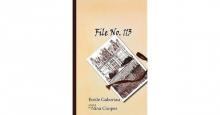 Le dossier no. 113. English
Le dossier no. 113. English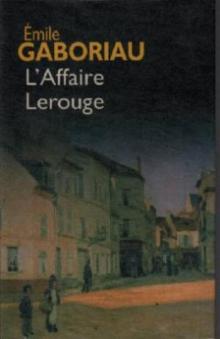 L'affaire Lerouge. English
L'affaire Lerouge. English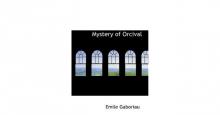 Le crime d'Orcival. English
Le crime d'Orcival. English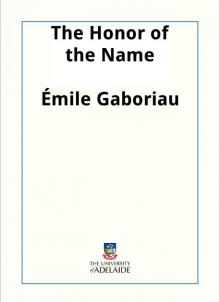 The Honor of the Name
The Honor of the Name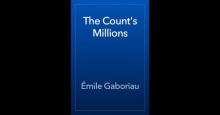 The Count's Millions
The Count's Millions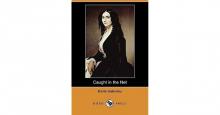 Caught in the Net
Caught in the Net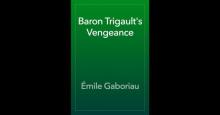 Baron Trigault's Vengeance
Baron Trigault's Vengeance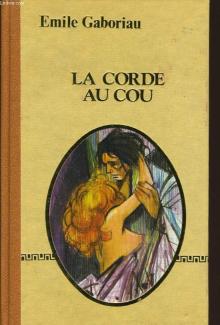 La clique dorée. English
La clique dorée. English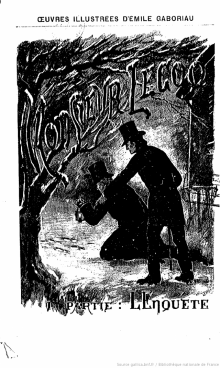 Monsieur Lecoq, v. 1
Monsieur Lecoq, v. 1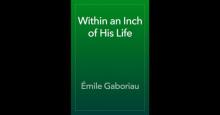 Within an Inch of His Life
Within an Inch of His Life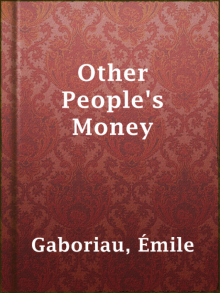 Other People's Money
Other People's Money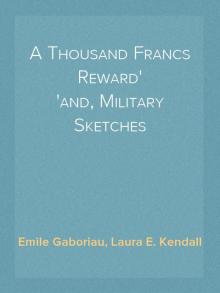 A Thousand Francs Reward; and, Military Sketches
A Thousand Francs Reward; and, Military Sketches